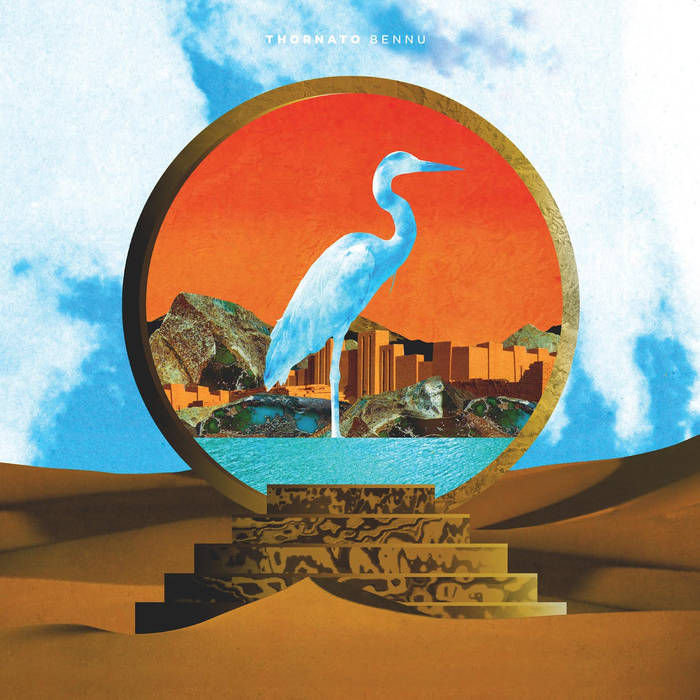Good music has the power to transport. Especially on the dance floor, the right soundtrack can make you close your eyes, leave everything behind and travel to new places. The new album Bennu from Wonderwheel delivers this type of experience. As a complete body of work, or track for track, the album uses the whim of exotica to draw us in and takes us around the globe. It takes teeth to be able to mash up Ghanaian vocals with Ecuadorian marimbas, to host four languages on one album and offer dembow soul next to dancehall and chopped up African rhythms. New York-based producer Thor Partridge, AKA Thornato, shows up and shows off his handling and arranging style with an honest curiosity and admiration for the sounds he stacks. Bennu is a Thor’s sonic bouquet, a collection of musical stems picked from Jamaica, Ecuador, South Africa, Colombia and beyond that when gathered together, seem to enhance each other.
As diverse as the record is, there is a consistency in the approach to the mashups. Thor explains his relationship to music, “…sometimes you meet a stranger and it feels as if you've known them forever. Music can be the same. It's the one language that all human beings can communicate with regardless of language. I'm attracted to sounds that can stand on their own. I don't like to process sounds too much, I think it loses its soul...” The comfort in Bennu is the way it curates contemporary sounds with traditional elements, building bridges with elements of familiarity.
One of the highlights on the album is the Afro-Ecuadorian sound in “El Oro De La Tolita.” Although there has always been a large population of descendants of African slaves in Ecuador, the sonic culture is less recognized than from neighboring countries. Many of these African slaves settled along the northwest coast in the province of Esmeraldas. This is home to Grupo Taribo, featured on the track. “El Oro De La Tolita” pays homage to this place through rhythms dropping along the planks of a marimba, honoring the ancestors that were known for their excellent metal work. Marimba is a Bantu word for xylophone and is an instrument that likely evolved from its ancestor, the balafon, archiving the movements in the African diaspora. With the skills that Thor is steadily becoming known for up and down the Americas, look for the Busy Twist remix of “El Oro De La Tolita” that weaves in Ghanaian singer Abongo in a style that pretty much commands the body to dance.
Another favorite track is “Deux a Deux” that takes us to South Africa. During a month-long recording session in Cape Town, Thor linked with Avi Heavner and Dan Eppel. “Dan’s studio turned in to a meeting place for us and musicians from all over South Africa and beyond. We got to work and record with some amazing musicians, one of which is the legendary uhadi bow player, Madosini. We also worked with some artists from Democratic Republic of the Congo and I become very fond of kwassa kwassa. It's basically a subgenre of soukous and there are some really nice dance moves that accompany the music.” The track “Deux a Deux” spotlights South African duo Kongo Elektro, made up of Dan Eppel and Mapumba. While the song begins with a gentle South African township cadence, it peaks with Caribbean-inspired raga. In the end, it is all about the drums. The song feels like a postcard from good times, a sonic memento.
“Chemagei” is another fire starter. With angled rhythms that are reminiscent of tracks MIA or Buraka Som Sistema would be on, the song is as raw as it is polished. The vocals come from the Kalenjin people of Kenya and were recorded by the Singing Wells Project, a nonprofit organization with the London record label Abubilla Music and Ketebul Music in Kenya. The aim of the project is to identify, preserve and promote diverse musical traditions in eastern Africa. I would say mission accomplished in this track.
After hearing the album a few times, the reason for its name Bennu becomes apparent. According to Egyptian myth, the bennu bird is a self-created deity that represents the soul of Ra, a sun god. The bennu rises from dust, like a phoenix, and soars. The album never loses sight of traditions, but is far from bound by them. Guarantee this won’t be the last time you will be hearing about Bennu: like the legend, it is about to take flight.








